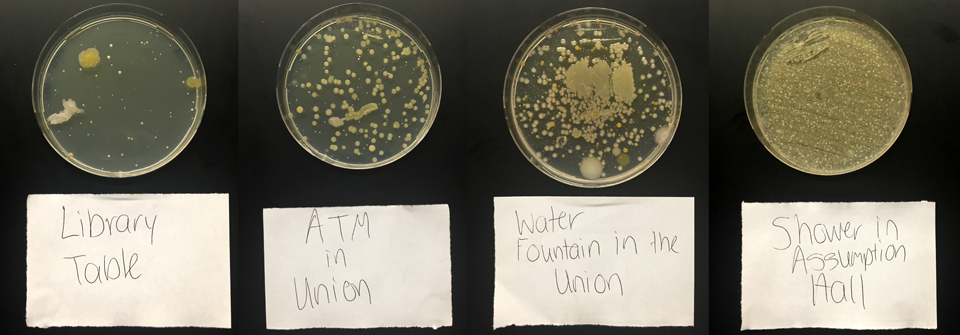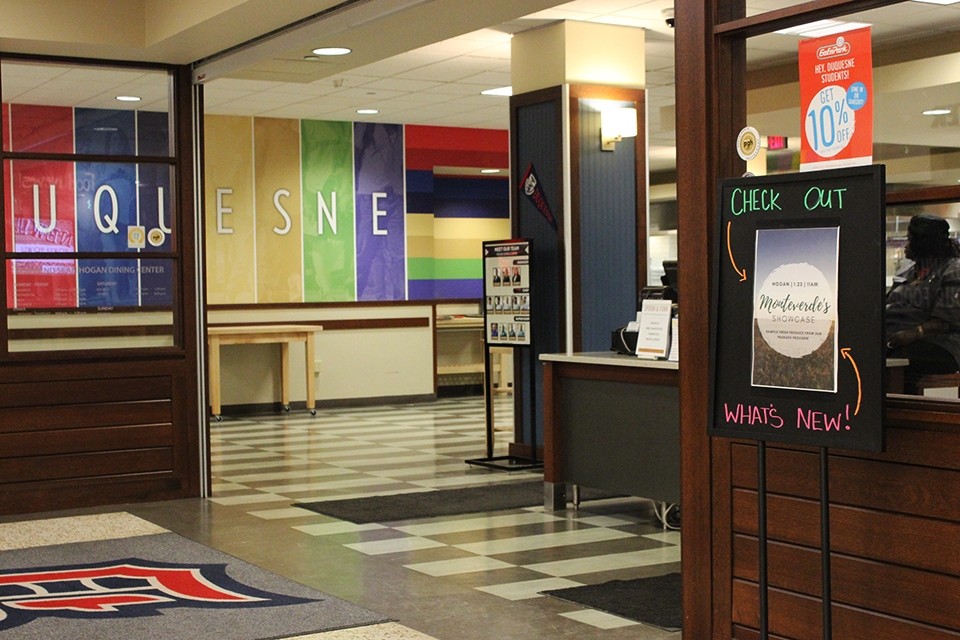

These Petri dishes are filled with several strains of bacteria collected from frequently visited sites on Duquesne’s campus.
By Brandon Addeo and Kaye Burnet | The Duquesne Duke
Forget computer keyboards and door knobs – the germiest sites on campus might actually be the very places students go to get clean.
According to a study performed for The Duke by four Duquesne biology students, out of 12 tested areas on campus, the floor of a communal shower on the third floor of Assumption Hall carried the most bacteria.
Biology students Zach Resko, Brittany West, Joe Sallmen and Anita Ghosh swabbed a dozen frequented areas on campus to see how much bacteria was present. They took samples from areas such as an elevator door knob in Brottier Hall, a computer keyboard in Towers and a soap dispenser in the Student Union bathroom.
The samples were then spread into Petri dishes, which were placed overnight in an incubator, according to Resko. The next day, the students examined the results to see what bacteria had grown.
“It just shows, you need to wear shoes in the shower,” Sallmen said, pointing to a Petri dish filled with bacteria taken from the Assumption Hall shower.
The rest of the “worst offenders,” according to Sallmen, are the water fountain in the Student Union across from the Apple store, the buttons on the ATM in the Student Union, a table in Gumberg Library and the interior of a clothes washer in Assumption.
Indicating a patch of off-white growth in the library table Petri dish, Sallmen said, “We even have what looks like a fungus or some mold spores here.”
Bill Zilcosky, director of building services at Duquesne, said objects such as communal showers, washers and tables in campus dorms and buildings are cleaned once a day every weekday.
Zilcosky said the department focuses on cleaning are sinks, countertops, door knobs and handles of toilets and faucets.
Bacteria grow in warm, moist conditions, such as the interiors of showers and the spigots of water fountains, according to Sallmen. Plastic surfaces tend to host more bacteria than metal or porcelain.
Sallmen said the presence of bacteria “doesn’t necessarily mean people should get nervous.”
“Even though they’re there, it doesn’t mean they’re bad,” he said.
Zilcosky said it can be difficult to fight illness-causing bacteria on campus.
“[It’s] a constant challenge for us because of the numerous crowded buildings with high traffic restrooms and public space on campus,” Zilcosky said.
Sallmen said it is difficult to identify the types of bacteria observed without extensive work, but it is likely that different species, including E. Coli are present.
According to research done at the University of Arizona in 2010, E. Coli is especially common in communal clothes washers, such as the one tested in Assumption Hall. There is approximately one tenth of a gram of feces in the average pair of underwear, the study showed, which can carry a number of different germs, including the hepatitis A virus, norovirus, rotavirus, salmonella and E. Coli.
John Stolz, a professor of environmental microbiology at Duquesne, said most bacteria and other microscopic organisms in the environment are helpful rather than harmful.
“We have 10 times more [microscopic organisms] in our bodies than our own cells,” Stolz said. “They help digest our food and prevent harmful microbes from invading.”
Dr. Michael Essig, medical director and professor in Duquesne’s physician assistant program, also said that many bacteria are not harmful.
Essig added that practicing proper hygiene is the best way to avoid harmful bacteria.
“Do what your mom told you to do,” he said. “Respect your body, wash up coming out of the bathroom.”




